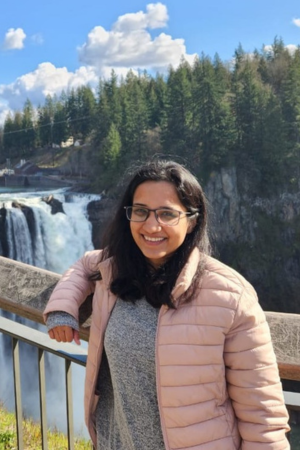Sadaf's Experience
Published: 3 September 2024
'My biggest takeaway from this programme was the peer-to-peer interaction. It provided an opportunity to meet people whose stories and experiences were very different from my own and to learn from them.'
Education Public Policy & Equity, MSc
What were you doing before your Masters?
Prior to joining the Masters programme, I worked in a small fishing village in India that is home to settler communities and refugee migrants. There, I developed and implemented place-based educational programmes designed to strengthen foundational literacy amongst public-school students by encouraging students to actively participate in the learning process and fostering a sense of inclusion and belongingness through the curriculum.
Why did you choose the University of Glasgow? Why did you choose your programme?
The programme at Glasgow was different from a lot of other education and policy programmes that I was researching. The aspects of social justice and equity adopted in the curriculum were particularly meaningful for me, and resonated with what I was looking for.
I gravitated towards the Education, Public Policy & Equity programme because I was primarily interested in merging my grassroots experience with theoretical frameworks that would allow me to deep dive into keys areas of education and policy in a global context. I was interested in understanding how policies can affect educational environment and outcomes for students, and whether they can be manipulated to promote greater equity. In addition, policy was more interesting to me as it offered a more multi-disciplinary perspective to understanding issues in education. As someone who is passionate about creating social impact, I was drawn to the promise of rigorous inquiry into thinking about educational solutions that are meaningful, sustainable and just. Education is a dynamic and complex process and needs to be understood from different standpoints which the programme is designed to facilitate.
What’s the most important thing you feel you’ve learned?
At the heart of the classroom experience were very rich peer discussions that took place. Given the diverse and global background of students and their experiences, I feel I developed the ability to appreciate different worldviews and the awareness to understand historical contexts surrounding various topics. This rich environment challenged and helped break stereotypes we sometimes unconsciously hold and promoted a more nuanced understanding of people and places different from our own.
What are you doing now? How did your studies help prepare you for your chosen career?
I currently work as a policy researcher where I examine micro level contexts in which the newly introduced dual apprenticeship policies in India affect inequalities of access, learning and labour market outcomes for young people. My work unfolds at the intersection of gender, class and culture to examine if policies and institutional factors can manipulate outcomes and aspirations for young people from marginalized backgrounds and to help create better and more equitable social and economic outcomes.
Looking back, I can see how the programme equipped me with skills to deeply engage and analyse policies something that is core to my work as an education policy researcher today. The combination of different courses I took helped me understand education policy from a multifaceted perspective and think critically about what education in a constantly changing world of work means. It has provided me with the vocabulary to put data into theoretical concepts and engage deeply with the political, cultural and social contours of policy issues. The courses also provided me with the training to undertake rigorous research and what it means to be a good researcher; all of which kind of laid the foundation for my current role in research.
Do you have any advice for future students?
My biggest takeaway from this programme was the peer-to-peer interaction. It provided an opportunity to meet people whose stories and experiences were very different from my own and to learn from them. I strongly believe that being exposed to spaces beyond ones that we inhabit, helps break stereotypes about people and cultures, and opens us up to new possibilities. For me, this learning has been at the heart of my experiences in the programme, and I would encourage future students to take the time to listen to each other’s stories and to get to know their classmates.
What was your favourite part about studying at UofG, about living in Glasgow?
I loved wandering about the University campus which was absolutely beautiful. I was lucky to chance upon Celtic band practices in the University Cloisters a few times which was nothing short of a magical experience. I had never experienced anything like it, and I cherished these unexpected and wonderful moments simply walking around.
Glasgow was a great city to live in. I loved strolling through Kelvingrove Park to reach the University, and exploring the stunning architecture and landscapes. The city is also a kaleidoscope of art work and you can see bursts of creativity everywhere. The art galleries and museums were a joy to visit. It’s definitely a city with culture, personality, and humour.
First published: 3 September 2024


